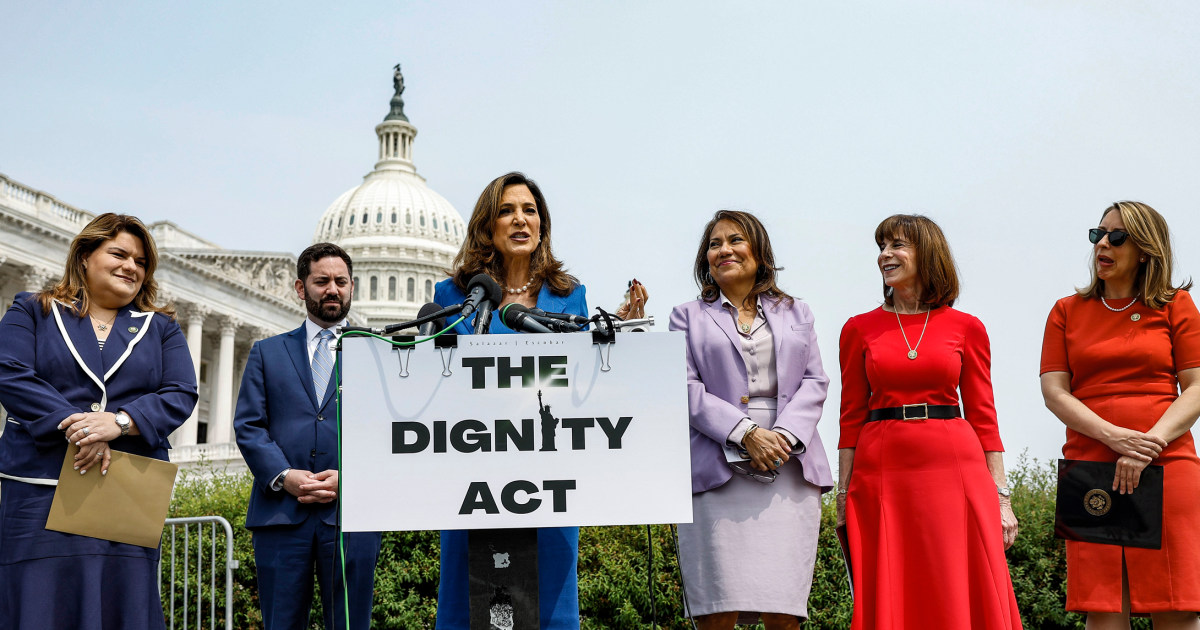Two Latina congresswomen proposed a bipartisan immigration bill on Tuesday, that would create a 12-year, two-part path to legal status and would require the border first to be declared secure before anyone on the path would be granted legal status.
The congresswomen, Rep. Maria Salazar, R-Fla., and Rep. Veronica Escobar, D-Texas, call their legislation «The Dignity Act.»
They said it would allow people in the country illegally to work and not be deported. It would speed up the asylum process and detain asylum seekers arriving at the southern border in one of five “humanitarian campuses” where they will remain until their case is resolved. It would also reduce the payment of people without legal permanent status to finance border infrastructure.
Salazar said the measure should not be confused with the amnesty law signed by former President Ronald Reagan in 1986. The bill has tougher measures and higher penalties than a Republican border security bill passed by the House on May.
“I don’t want anyone to confuse amnesty with dignity,” Salazar said at a news conference on Capitol Hill. «This is not amnesty. Amnesty is what the undocumented have right now and have had for 30 years. Free roads, free schools and free hospitals. Under the Dignity Law, everyone pays for their trip.»
Salazar, who is Cuban-American, said the goal of the bill is to «give dignity» to Border Patrol agents who she says are «overworked and underpaid,» the business community that needs workers, and the millions and millions of people «who are invisible». For most Americans, they’re doing the jobs that others aren’t willing to do.»
The legislation was proposed just over a week after the Biden administration ended the use of a healthcare law, Title 42, imposed during the pandemic. Its projected end brought more people to the border to seek asylum or other entry, but not as many as had been projected.
Many of the people who arrived, including those processed by Border Patrol, were housed in El Paso before continuing on to the rest of the country. The city saw hundreds of people sleeping on its streets in the cold of December and again in recent months.
“Communities like mine in El Paso, Texas, communities along the southern border and now even communities far from the southern border are impacted by inaction by Congress,” said Escobar, who is Mexican-American.
Congress has repeatedly failed to pass legislation that modernizes its immigration laws and keeps up with changing immigration realities.
In a statement, Vanessa Cárdenas, executive director of America’s Voice, an immigrant advocacy group that has supported immigration reform, called the legislation an important alternative to the House Republican bill. The Democratic-led Senate is not likely to accept the House’s Republican bill, which focuses primarily on enforcement.
But he questioned whether the Salazar-Escobar bill had much chance of moving forward, saying the House «seems to prefer the politics of a broken immigration system to real solutions.»
Specifically, some of the provisions of the Salazar-Escobar bill are:
— Requires the General Accounting Office to certify that for a full year, Border Patrol has detected and apprehended 90% of people crossing the border illegally or attempting to cross the border before allowing immigrants to obtain legal permanent status.
— Allows people in the country for five years without legal status and without a criminal record to work and be protected from deportation for seven years through the «Dignity Program.»
— Those on the «Dignity Program» will have a 1.5% «dignity fee» withheld from their paycheck, in addition to the taxes they pay. They will also pay a fee of $5,000.
— Allow those who complete the Dignity Program to gain «Dignity Status,» an additional five years to work and stay in the US. The status can be renewed indefinitely.
— Allow those who complete the Dignity Program to enter the five-year Redemption program, during which they learn English, American civics, perform community service, or pay another $5,000. If completed successfully, they obtain lawful permanent residence status, the stepping stone to citizenship. The bill requires participants to go «to the back of the line.»
— Speed up the asylum process to a total of 60 days.
— Create immediate protected status and a simplified pathway for immigrants who arrived or came to the country as children, referred to as Dreamers in the bill, or those with Temporary Protected Statusa type of protection from deportation granted by the president for people native to countries that have experienced natural disasters, conflict, or other upheavals.

